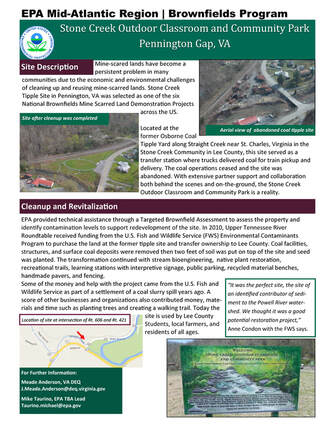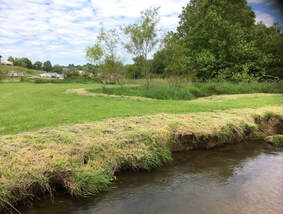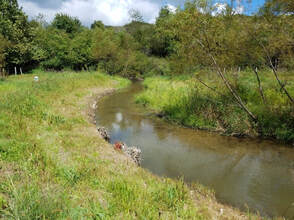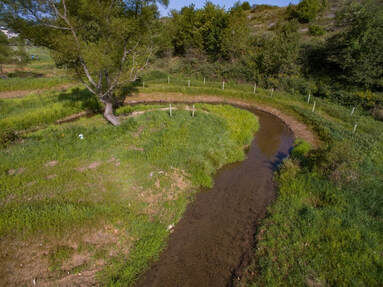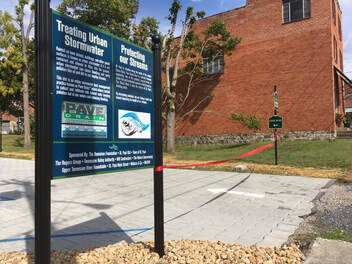UTRR 20th Year Anniversary
Other Projects and Progress
Restoring and Protecting Streams
|
This photo shows a good example of how
erosion had affected the stream banks. |
Upper Tennessee River Roundtable is continuing stream projects in Tazewell in 2020 that began a few years ago with several sites completed last year. This work is funded by the Virginia Department of Environmental Quality in collaboration with U.S. Fish & Wildlife Service Partners Program, Tazewell Soil and Water Conservation District, and Canaan Valley Institute.
|
After the project, the stream banks look much improved.
Reducing stormwater runoff with permeable surfaces
|
|
A permeable surface allows rain to gradually filter into the ground instead of running off an impervious surface, such as asphalt. The Roundtable secured funding to install a permeable paver parking lot in St. Paul with installation completed by the town. The sign pictured here lets everyone know why this surface is different from traditional asphalt surfaces. This project was funded by a Dominion Charitable Foundation grant to the Roundtable along with funds from the Tennessee Valley Authority. Previously, the Roundtable installed permeable pavers at the concession stand at Leeman Field in Jonesville, Lee County, a handicapped parking space at the Birding Trail parking lot in Saltville, Smyth County, and under a green roof kiosk (also created by the Roundtable) at Clear Creek Outdoor Classroom, Norton. Another project completed by the Roundtable and the town of Abingdon involved replacing concrete with a permeable surface on a section of sidewalk in front of A Likely Yarn in Abingdon.
|
Installing Storm Drain Pollution Separators
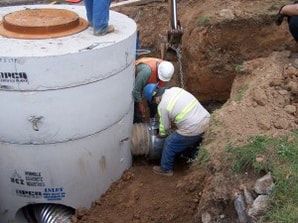
Two hydrodynamic storm drain separators reduce pollution entering Indian Creek, home to special species in Cedar Bluff in Tazewell County. The Roundtable installed a third separator in a storm drain that empties into the Clinch River, also in Cedar Bluff. Storm water flows into a storm drain and into a unit that captures and stores in separate compartments these materials: sediment, oils, gases, litter, leaves and grass. Units are vacuumed annually. To illustrate the effectiveness, one vacuuming of the largest unit removed 35 cubic feet of sediment, four cubic feet of organic matter, about a dozen pieces of litter; oils and gases settled on top of sediment. Funded by U.S. EPA. (Image credit: Carol Doss, UTRR.)
Protecting Endangered Species
A project in Jonesville in Lee County removed 14,220 cubic yards of aged sawdust, assisting in the return of the Lee County Cave Isopod. Leachate from the sawdust had previously eliminated the creature from that karst area. The sawdust was hauled to a surface coal mine where it was applied during the seeding process. Funding provided by U.S. EPA and TVA with assistance from Daniel Boone Soil and Water Conservation District, U.S. Fish and Wildlife Service, Virginia Department of Mines, Minerals and Energy, Sigmon Coal Company and Russell Lumber.
Creating Rain Gardens
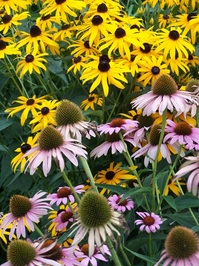
Upper Tennessee River Roundtable installed 20 rain gardens across the region to capture pollution and reduce runoff. A rain garden is a garden bed in a shallow basin that captures the first half inch to inch of rain, slowly releasing the water through mulch, topsoil, sand and compost before releasing it into the subsoil. Rain gardens contain plants that tolerate both very wet and very dry conditions.(Image credit: Chris Green, UTRR.)
Coordinating regional environmental education network
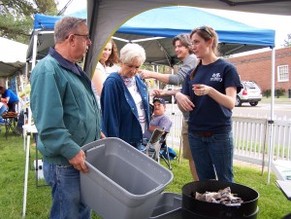
Upper Tennessee River Roundtable manages one of the environmental education networks in Virginia as overseen by Virginia Department of Conservation and Recreation: Southwest Virginia Environmental Education Team (SWEET). The Roundtable received numerous grants for SWEET to offer environmental education workshops for Project WET, Project Learning Tree, Livable Neighborhoods, RiverSmart and RiverWorks Discovery ® as well as a series of workshops. SWEET also assisted with the state environmental education conference.
Each year, the Roundtable staff assists soil and water conservation districts with their environmental education events.
The Roundtable also led an effort to create an environmental education lesson guidebook for Washington County schools. (Image credit: Carol Doss, UTRR)
Each year, the Roundtable staff assists soil and water conservation districts with their environmental education events.
The Roundtable also led an effort to create an environmental education lesson guidebook for Washington County schools. (Image credit: Carol Doss, UTRR)
Promoting Low Impact Development
In partnership with numerous agencies, the Roundtable helped with 13 workshops focusing on Low Impact Development techniques for local governments.
Keep Southwest Virginia Beautiful
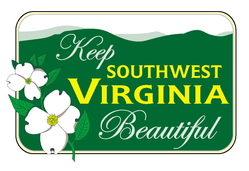
Keep Southwest Virginia Beautiful, the nation’s largest regional certified Keep America Beautiful affiliate, was launched under the umbrella of the Roundtable in 2007. The formation of this affiliate resulted from a vision of Roundtable Coordinator Carol Doss and Keep America Beautiful national education trainer Sue Smith. The affiliate is successful because of a unique partnership among nine counties and two cities.
Keep Southwest Virginia Beautiful won numerous national awards while functioning under the Roundtable. The affiliate later separated from the Roundtable to form a separate nonprofit and continues to be an award winner. The Roundtable and Keep Southwest Virginia Beautiful partner together on the Roundtable’s five-year work plan and the annual Regional Stream Cleanup.
For more information on Keep Southwest Virginia Beautiful, visit the website:www.keepswvabeautiful.org. For more information on Keep America Beautiful, visit the website: www.kab.org.
Keep Southwest Virginia Beautiful won numerous national awards while functioning under the Roundtable. The affiliate later separated from the Roundtable to form a separate nonprofit and continues to be an award winner. The Roundtable and Keep Southwest Virginia Beautiful partner together on the Roundtable’s five-year work plan and the annual Regional Stream Cleanup.
For more information on Keep Southwest Virginia Beautiful, visit the website:www.keepswvabeautiful.org. For more information on Keep America Beautiful, visit the website: www.kab.org.
Promoting Assign-A-Highway
Upper Tennessee River Roundtable successfully promoted a program that utilizes probationers, who are nonviolent offenders, to pick up two-mile sections of roadsides every two weeks. The Roundtable received state grants to promote this program for four years, increasing the number of locality participants across Virginia from four to 41 and earning state and national awards. The program originated with St. Paul, Virginia Attorney Frank Kilgore who successfully launched the Assign-A-Highway Program in Buchanan County to achieve sustainable roadside cleanups. Keep Southwest Virginia Beautiful now promotes the program. For more information on this innovative and highly successful program, see www.assignahighway.com.
Helping Restore Abandoned Coal Mine Lands/Treating Acid Mine Drainage
Through a partnership with the Virginia Department of Mines, Minerals and Energy, the Roundtable acquires funding to pay for reclamation of abandoned mine lands and treatment of acid mine drainage.
A current project near St. Charles in Lee County has reclaimed a former coal tipple site where coal was loaded onto rail cars many years ago. The site was transformed into an outdoor classroom and community park and is open to the public.
A current project near St. Charles in Lee County has reclaimed a former coal tipple site where coal was loaded onto rail cars many years ago. The site was transformed into an outdoor classroom and community park and is open to the public.
Five-Year Work Plan
Every five years, the Roundtable collaborates with its Organization Coordinating Group (called OCG) to create a comprehensive plan of work. The first work plan was completed, with many goals exceeded. The Roundtable completed the first three work plans with generous funding and lots of assistance from a wide variety of project partners. The fourth plan is being developed.
